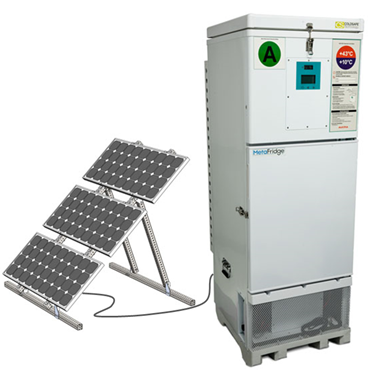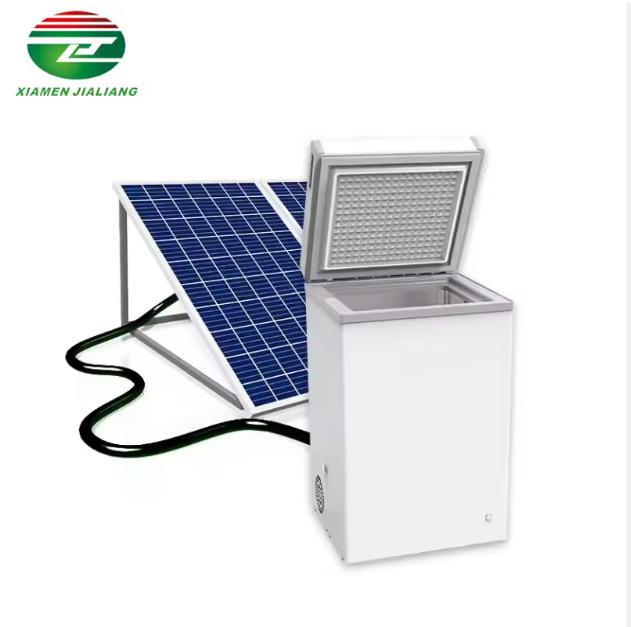A solar refrigerator can help you maintain a green lifestyle while keeping your food fresh.
A solar refrigerator can help you maintain a green lifestyle while keeping your food fresh.
Blog Article
Unlocking the Possible: How Solar Fridge Can Change Your Energy Usage
The appearance of solar fridges provides an engaging possibility to reshape our strategy to energy consumption. By successfully utilizing eco-friendly solar power, these systems assure not just to lower dependancy on traditional energy sources however also to boost food conservation and safety and security, specifically in underserved regions.
Just How Solar Refrigerators Work
Solar refrigerators operate by using solar power to power their cooling systems, efficiently using renewable energies to keep low temperatures. These systems typically contain photovoltaic (PV) panels that convert sunshine right into power. This power is after that used to run the compressor, follower, and various other parts important for refrigeration.
The main mechanism in a solar fridge is the vapor-compression cycle, comparable to conventional fridges. In the evaporator, the cooling agent soaks up warm from the inside of the refrigerator, thus reducing its temperature.
Solar refrigerators may likewise incorporate battery storage systems, enabling them to operate during non-sunny hours or in cloudy problems. This ensures a continuous cooling effect, making them appropriate for numerous applications, particularly in remote areas lacking accessibility to reliable electrical energy. By integrating solar innovation, these refrigerators add to power performance and sustainability in food storage and conservation.
Secret Advantages of Solar Refrigeration
The assimilation of solar modern technology right into refrigeration systems provides various benefits that prolong beyond plain power financial savings. One of the most significant benefits is the reduction of carbon impact. By utilizing renewable solar power, these systems decrease dependence on nonrenewable fuel sources, adding to a more lasting atmosphere. This shift is particularly essential in regions where power supply is unreliable or non-existent, permitting communities to maintain food preservation and safety and security.

Moreover, making use of solar power can result in energy independence, allowing users to produce their very own power and lower susceptability to rising and fall power costs. Generally, the adoption of solar refrigeration presents a diverse option that not just addresses energy consumption however likewise promotes environmental sustainability and improves food conservation capabilities in underserved areas.
Power Savings and Efficiency
With the climbing prices of power and raising recognition of environmental concerns, energy savings and effectiveness have come to be critical considerations in refrigeration innovation (solar refrigerator). Solar fridges utilize eco-friendly energy sources, significantly reducing dependence on conventional electrical power grids. By harnessing solar energy, these systems minimize energy consumption, making them a financially feasible option for both property and industrial applications
The design of solar fridges incorporates sophisticated insulation materials and energy-efficient compressors, which guarantee optimal performance while making use of marginal energy. Several solar fridge models additionally include programmable setups and clever technology that permit individuals to monitor and handle energy usage successfully. This smart style results in reduced electrical power bills and reduced operational costs gradually.
Furthermore, solar fridges are equipped web with batteries that store excess energy produced throughout sunny days, allowing continual operation even throughout periods of low sunlight. This capacity improves their efficiency, ensuring that food and subject to spoiling things are continually kept at secure temperature levels.
Ecological Influence and Sustainability
Taking advantage of sustainable energy not only enhances energy financial savings but likewise considerably adds to environmental sustainability. solar refrigerator. Solar refrigerators operate tidy, renewable resource sources, decreasing dependence on nonrenewable fuel sources that contribute to greenhouse gas exhausts. This change in energy usage mitigates climate change effects and cultivates a much healthier earth

Furthermore, solar refrigerators are especially beneficial in remote locations where electrical power gain access to is restricted or non-existent. By providing a feasible refrigeration remedy without the need for considerable infrastructure, they promote lasting growth in underserved communities. This access not only improves food safety but also reduces food perishing, consequently reducing waste.
Selecting the Right Solar Refrigerator
Selecting the suitable solar fridge requires careful factor to consider of various aspects to make certain ideal efficiency and performance. Examine the power requires based on your usage patterns. Determine the overall electrical power needed to maintain your items cool down, which assists in picking an unit with a proper solar panel size to meet these needs.

One more essential aspect is the sort of solar fridge-- compressor or absorption. Compressor models are usually more effective and better fit for environments with varying temperatures, while absorption fridges might be more effective for off-grid applications due to their simpleness.
Last but not least, guarantee the system has reputable solar elements, including panels, batteries, and a charge controller, to assure long-term capability. By meticulously considering these factors, you can pick check out this site a solar fridge that lines up with your power objectives and adds to sustainable living.
Final Thought
In recap, solar refrigerators stand for a considerable innovation in power usage, using a lasting alternative to standard refrigeration techniques. By taking advantage of solar energy, these systems not only reduce dependence on fossil gas yet likewise boost food safety and security and decrease ecological impact.
Report this page